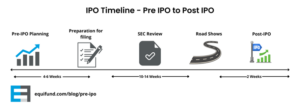If you’re interested in investing in exciting medical technology (MedTech) companies and you’re wondering “when are they going to IPO?”…
In most cases, the likely outcome is they’re never going to make it to public markets!
And strangely enough, that’s ok!
Staying private longer instead of going public too soon could create better long-term outcomes (of course, being an early stage investor in any MedTech company means there’s a high degree of risk that the company may never see any kind of exit, much less go public).
That’s why today, we’re going to take a deeper look at one of the most misunderstood aspects of investing in MedTech…
The Fundraising Ecosystem in MedTech
When most investors think of early-stage investing, they usually think of the high-flying software companies that have defined Silicon Valley for the past 20-odd years.
After all, several of the most valuable stocks in the world – like Apple, Google, and Microsoft – all got early funding from venture capital firms.
But back when many of those companies were just starting, tech investing was still a very new idea… and venture capital was the only place crazy enough to fund these ideas.
However, the playbook for tech investing is pretty well known at this point. The software industry has greatly matured since the dot-com bust and it’s not nearly as “risky” as it once was.
This is due in part to the entire tech ecosystem evolving and becoming more decentralized. This, in turn, has significantly brought down costs to start new tech companies.
In fact, In 2008, Y-combinator founder Paul Graham made a rather shocking statement…
The reason there aren’t more Googles is not that investors encourage innovative startups to sell out, but that they won’t even fund them.
I used to think of VCs as piratical: bold but unscrupulous. On closer acquaintance they turn out to be more like bureaucrats.
Maybe the VC industry has changed. Maybe they used to be bolder. But I suspect it’s the startup world that has changed, not them.
The low cost of starting a startup means the average good bet is a riskier one, but most existing VC firms still operate as if they were investing in hardware startups in 1985.
They’re terrified of really novel ideas, unless the founders are good enough salesmen to compensate.
But it’s the bold ideas that generate the biggest returns.
There’s a lot to unpack in this statement, but perhaps the most interesting one is this…
Most professional investors who allegedly specialise in high-risk ventures aren’t good at taking risks.
Even worse, they’re investment models are based on old paradigms that aren’t necessarily useful in today’s investment landscape.
For tech companies, it’s pretty easy to see how radically early-stage funding has changed over the past 20 years.
In the early 2000’s, there was already a well developed ecosystem of VCs in Silicon Valley…
But they tended to prefer to fund companies that seemed like a “sure thing” instead of taking a chance on risky startups with unproven technical founders.
And because these VC’s were pretty much the only game in town funding deals, they got to dictate terms.
For the founders, this meant they usually had to agree to non-founder-friendly terms from the VCs in order to get funding…
And had the very real risk of being ousted from their company and being replaced by the VC’s favorite band of suits.
But then, the modern tech infrastructure started to develop…
A combination of open source software, modern web frameworks, SaaS developer tools, cloud hosting, and better distribution channels made it easier for Founders to start developing their products.
This meant technical founders who couldn’t raise money from VCs from the power of an idea could instead bootstrap their way to a “minimum viable product” to get early traction (and then funding).
This in turn shifted the balance of power into the founders favor…
And in turn, began to change the entire fundraising landscape for tech companies (and the types of deals founders could negotiate).
Easy access to flexible, institutional seed funding led to an explosion of tech startups, and today this is the default path for tech startups to get started.
However, in MedTech, it’s not like you can max out your credit cards, quickly spin up a new drug (or device), test it on a bunch of people, and hope for the best.
In many cases, it requires millions of dollars and years of work before a product can be taken to market and commercialized.
Not to mention, those multi-million dollar check sizes often mean non-founder-friendly deal terms.
But the same way the tech scene brought down costs by creating new infrastructure…
We’re starting to see the same thing happen in the world of medicine.
According to Jared Friedman, Managing Director at Y Combinator…
I’ve noticed that raising money for a biotech or other life science company in 2019 looks a lot like raising money for a tech company 10 years ago.
Since then, fundamental forces caused fundraising for tech companies to change dramatically.
And I believe that they are going to change biotech fundraising very much the way they changed tech company fundraising.
Because you can start cheaply, it’s now possible to start a biotech company the way people start a tech company.
By raising money incrementally, rather than a giant amount upfront, you can keep control of your company.
And you can work on your own idea, not just ideas that VCs come up with.
So what does any of this have to do with MedTech IPOs?
Before the 2000 dot-com bust, it was normal for smaller startups to IPO “early.”
Why? Because going public meant potentially getting access to large quantities of capital required to fund research and development (R&D) and scaling.
But because there’s so much money floating around in private markets, companies are staying private for far longer than they used to.
Now, we see tech companies raising billions of dollars in private money – and have large and growing revenue – before even thinking about an IPO.
MedTech companies, by contrast, tend to have no revenue and burn tons of cash each year (at least until a product is ready to market).
As a result, there’s often a lack of available private markets funding (or at least at deal terms the early investors and Founders were willing to accept).
Thus, the decision to go public is more centered around generating public market enthusiasm and raising money to continue funding research and development.
But thanks to the JOBS Act, everything changed for how BioTech and MedTech companies can get funding.
According to a Sept, 2020 article written by Bruce Booth, partner at Atlas Ventures…
The Jumpstart Our Business Startups (JOBS) Act is the unsung hero of the biotech IPO boom since its passage in 2Q 2012.
While largely discounted by the tech sector, the impact of the JOBS Act on biotech IPOs can’t be over-estimated in my opinion.
If you’ve read some of our other editorial around the Capital Market Slingshot and the Customer Shareholder Flywheel…
We believe that crowdfunding is a breakthrough financing strategy that helps founders get access to friendly sources of capital by turning customers into shareholders (and then into advocates to promote your product to bring in new customers and new shareholders).
But it’s not just for direct to consumer brands who can quickly iterate and launch new products.
In the MedTech sector – which involves a rather convoluted product development process – it creates an opportunity to not only raise founder-friendly capital…
But build brand awareness with potential patients (or people who care for them) who can then ask their doctor for the solution…
AND build awareness among the healthcare providers who might want to use the technology with their patients.
Hopefully, this means the opportunity to develop novel and breakthrough medical technologies that can save lives.
And for investors, if the company is successful with its mission while private, it could translate into an opportunity to go public at potentially a much higher valuation down the road (or perhaps, they’ll catch the attention of a competitor and get acquired before that happens).
Final Thoughts
If you’re considering an investment into any early-stage MedTech company, patience is key.
Unlike tech companies that can seemingly bootstrap their way to an MVP and quickly scale…
Developing new medical devices takes substantially more time and money to bring to market and successfully commercialize.
However, on the plus side, this dynamic has the potential to create significant economic barriers of entry (or a “moat”) for companies that can navigate the process.
Remember: investing in any early-stage company is a high-risk endeavor.
But thanks to the JOBS Act, everyday investors have more opportunities to invest in these innovative medical technologies.
Sincerely,
Jake Hoffberg – Publisher
Equifund













